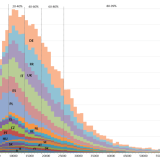
Des marchés du travail efficaces et inclusifs
Des marchés de l’emploi efficaces sont indispensables pour utiliser pleinement le potentiel de création d’emplois de l’économie à mesure que celle-ci émerge de la crise financière et économique. La crise a eu des conséquences très diverses sur le marché de l’emploi dans les États membres de l’UE, et certains groupes tels que les jeunes et les personnes ayant un faible niveau d’études ont été frappés de manière particulièrement dure. Les changements structurels rapides en cours entraînent également de nouveaux défis concernant d’éventuelles pénuries de main-d’œuvre et inadéquations entre l’offre et la demande de compétences dans divers secteurs et régions.
Le principal outil de l’UE pour encourager l’emploi et l’inclusion sociale est le Fonds social européen: il aide les personnes à obtenir un emploi, intègre les personnes défavorisées dans la société et renforce l’égalité des chances pour tous. De plus, une législation européenne de vaste portée réglemente les droits des travailleurs sur le marché de l’emploi. De plus, la Commission européenne a lancé en avril 2017 le socle européen des droits sociaux. Le socle s’appuie sur la politique sociale et liée à l’emploi de l’UE et la complète, afin d’orienter les politiques dans plusieurs domaines essentiels au bon fonctionnement et au caractère équitable des marchés de l’emploi et des systèmes de protection sociale.
- Commission européenne: Fonds social européen
- Commission européenne: socle européen des droits sociaux




























